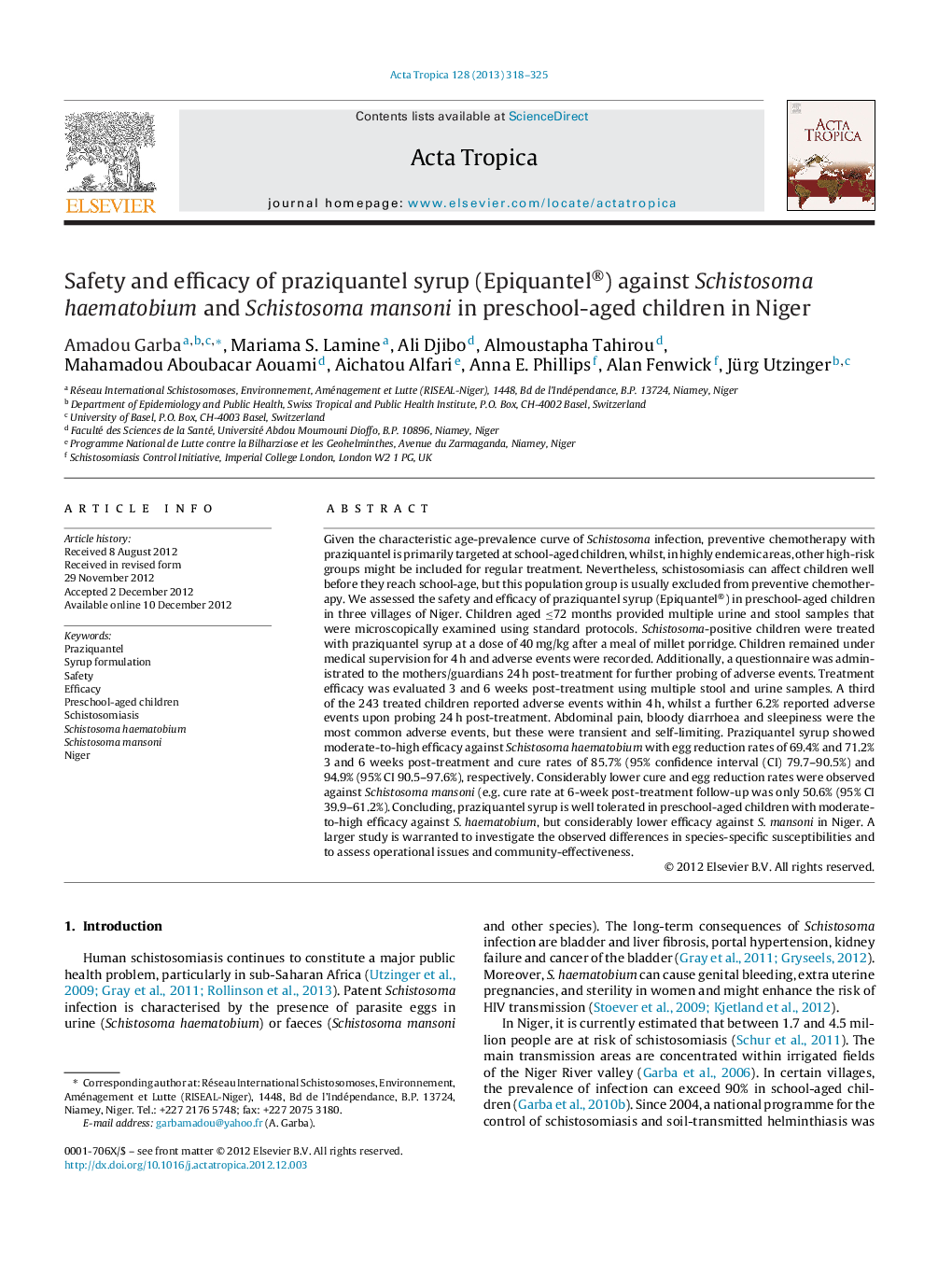| Article ID | Journal | Published Year | Pages | File Type |
|---|---|---|---|---|
| 3393877 | Acta Tropica | 2013 | 8 Pages |
▶ Praziquantel syrup (Epiquantel®) is safe in preschool-aged children. ▶ Efficacy against S. haematobium was moderate-to-high (cure rate: 85.7–94.9%; egg reduction rate: 69.4–71.2%). ▶ Efficacy against S. mansoni was considerably lower (cure rate: 50.6–75.0%; egg reduction rate: 18.5–66.7%).
Given the characteristic age-prevalence curve of Schistosoma infection, preventive chemotherapy with praziquantel is primarily targeted at school-aged children, whilst, in highly endemic areas, other high-risk groups might be included for regular treatment. Nevertheless, schistosomiasis can affect children well before they reach school-age, but this population group is usually excluded from preventive chemotherapy. We assessed the safety and efficacy of praziquantel syrup (Epiquantel®) in preschool-aged children in three villages of Niger. Children aged ≤72 months provided multiple urine and stool samples that were microscopically examined using standard protocols. Schistosoma-positive children were treated with praziquantel syrup at a dose of 40 mg/kg after a meal of millet porridge. Children remained under medical supervision for 4 h and adverse events were recorded. Additionally, a questionnaire was administrated to the mothers/guardians 24 h post-treatment for further probing of adverse events. Treatment efficacy was evaluated 3 and 6 weeks post-treatment using multiple stool and urine samples. A third of the 243 treated children reported adverse events within 4 h, whilst a further 6.2% reported adverse events upon probing 24 h post-treatment. Abdominal pain, bloody diarrhoea and sleepiness were the most common adverse events, but these were transient and self-limiting. Praziquantel syrup showed moderate-to-high efficacy against Schistosoma haematobium with egg reduction rates of 69.4% and 71.2% 3 and 6 weeks post-treatment and cure rates of 85.7% (95% confidence interval (CI) 79.7–90.5%) and 94.9% (95% CI 90.5–97.6%), respectively. Considerably lower cure and egg reduction rates were observed against Schistosoma mansoni (e.g. cure rate at 6-week post-treatment follow-up was only 50.6% (95% CI 39.9–61.2%). Concluding, praziquantel syrup is well tolerated in preschool-aged children with moderate-to-high efficacy against S. haematobium, but considerably lower efficacy against S. mansoni in Niger. A larger study is warranted to investigate the observed differences in species-specific susceptibilities and to assess operational issues and community-effectiveness.
Graphical abstractPreschool-aged children are currently excluded from preventive chemotherapy targeting schistosomiasis. We assessed the safety and efficacy of praziquantel syrup (Epiquantel®; 40 mg/kg) administered to 243 Schistosoma-infected preschool-aged children in Niger. Praziquantel syrup was well tolerated with moderate-to-high efficacy against Schistosoma haematobium, but considerably lower efficacy against S. mansoni.Figure optionsDownload full-size imageDownload as PowerPoint slide
